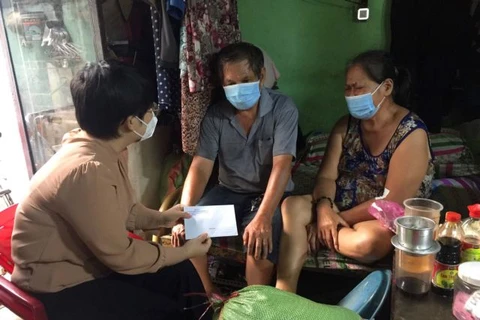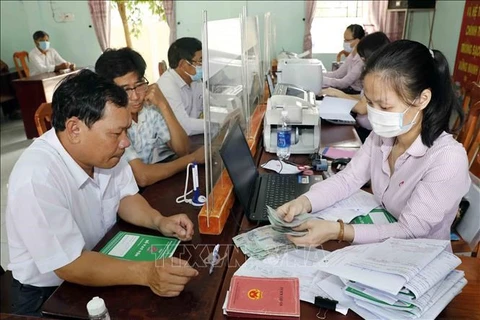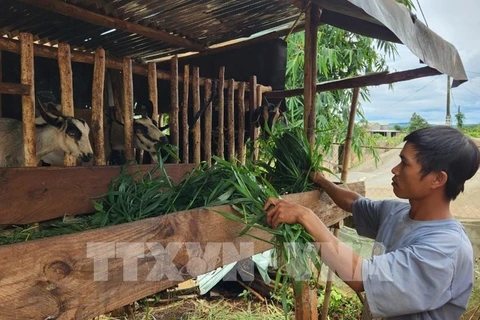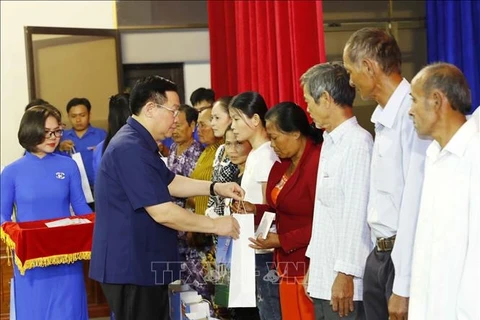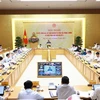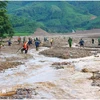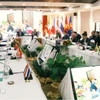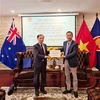Hanoi (VNA) - Vietnam had more than 1.58 million poor and nearly-poor households in 2023, representing approximately 5.71% of the total population, according to the Ministry of Labour, Invalids, and Social Affairs (MoLISA).
In its reprot on the poverty situation in Vietnam in 2023, the ministry said the national multidimensional poverty (MP) rate was 5.71% last year.
The northern midland and mountainous region had the highest MP rate (18.20%) with 587,952 poor and near-poor (PNP) households. The Central Highlands came next with 195,795 PNP households (12.46%).
The southeast region, meanwhile, took the lead in terms of poverty reduction with only 0.23% of its households being poor or near-poor.
If near-poor households were excluded, Vietnam had 815,101 poor households in 2023 (2.93%), down 1.1 percentage points compared to 2022.
The northern midland and mountainous region had the largest poverty rate (11.29%) with 364,681 households in need, followed by the Central Highlands (6.40%) and the north central region and central coast (3.83%).
Regarding poor districts defined by the Prime Minister's Decision 353 on the list of poor districts and extremely difficult communes in flatland, coastal areas, and islands between 2021 and 2025, there were 417,571 PNP households (47.94%) in the districts, of which 311,981 were poor and 159,590 near-poor.
At a meeting to review the three-year implementation of the National Target Programme on Sustainable Poverty Reduction, Minister of Labour, Invalids and Social Affairs Dao Ngoc Dung said poverty reduction efforts had gained some results, but the results were not sustainable in that many families slipped back into poverty after incidents like illness or loss of livestock.
He also underlined the slow progress of the programme, which can be attributed to the mindset of "over-reliance on the State's support". He called for the involvement and action of governments of all levels to effectively reduce poverty.
In 2024, the National Assembly assigned MoLISA the task of reducing the national MP rate by more than 1%, he said.
To this end, Dung stated that his ministry will continue to draft policies to provide those in need with conditional assistance, favourable loans and vocational training.
It will also offer opportunities to workers from impoverished households and ethnic minority groups to work abroad to raise their living standards.
Its support package also covers education, healthcare, accommodation, clean water, electricity and legal assistance. Social protection will be granted to those who are unable to work.
The ministry will also review and revise old poverty policies to avoid duplication and overlapping. The publication will serve as the basis for the implementation of poverty reduction and social welfare policies as of January 1, 2024, he added./.
In its reprot on the poverty situation in Vietnam in 2023, the ministry said the national multidimensional poverty (MP) rate was 5.71% last year.
The northern midland and mountainous region had the highest MP rate (18.20%) with 587,952 poor and near-poor (PNP) households. The Central Highlands came next with 195,795 PNP households (12.46%).
The southeast region, meanwhile, took the lead in terms of poverty reduction with only 0.23% of its households being poor or near-poor.
If near-poor households were excluded, Vietnam had 815,101 poor households in 2023 (2.93%), down 1.1 percentage points compared to 2022.
The northern midland and mountainous region had the largest poverty rate (11.29%) with 364,681 households in need, followed by the Central Highlands (6.40%) and the north central region and central coast (3.83%).
Regarding poor districts defined by the Prime Minister's Decision 353 on the list of poor districts and extremely difficult communes in flatland, coastal areas, and islands between 2021 and 2025, there were 417,571 PNP households (47.94%) in the districts, of which 311,981 were poor and 159,590 near-poor.
At a meeting to review the three-year implementation of the National Target Programme on Sustainable Poverty Reduction, Minister of Labour, Invalids and Social Affairs Dao Ngoc Dung said poverty reduction efforts had gained some results, but the results were not sustainable in that many families slipped back into poverty after incidents like illness or loss of livestock.
He also underlined the slow progress of the programme, which can be attributed to the mindset of "over-reliance on the State's support". He called for the involvement and action of governments of all levels to effectively reduce poverty.
In 2024, the National Assembly assigned MoLISA the task of reducing the national MP rate by more than 1%, he said.
To this end, Dung stated that his ministry will continue to draft policies to provide those in need with conditional assistance, favourable loans and vocational training.
It will also offer opportunities to workers from impoverished households and ethnic minority groups to work abroad to raise their living standards.
Its support package also covers education, healthcare, accommodation, clean water, electricity and legal assistance. Social protection will be granted to those who are unable to work.
The ministry will also review and revise old poverty policies to avoid duplication and overlapping. The publication will serve as the basis for the implementation of poverty reduction and social welfare policies as of January 1, 2024, he added./.
VNA

